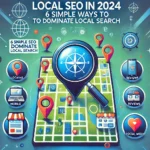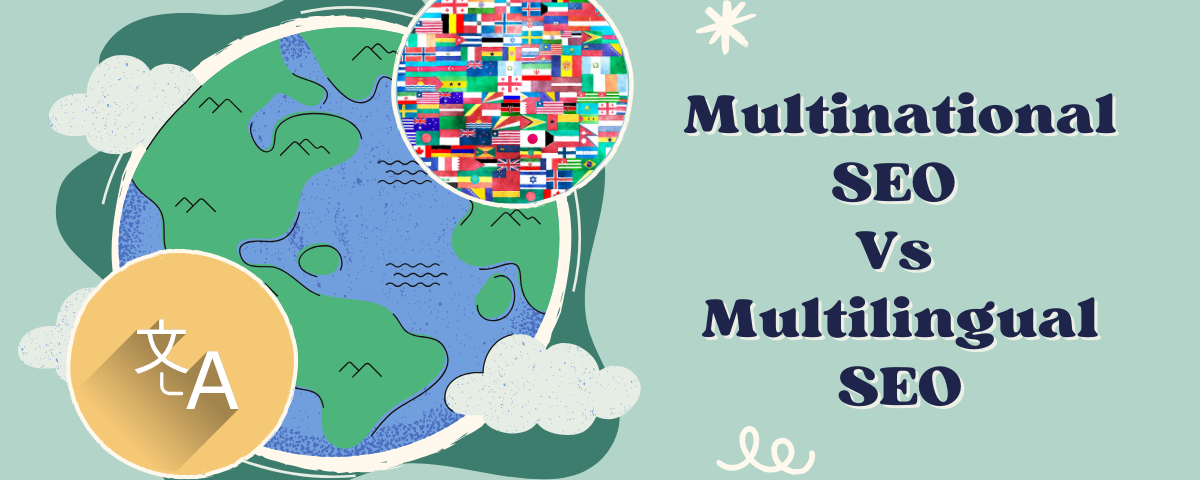
Reasons for Google Business Profile Suspension with Solutions
October 24, 2024
6 Simple Local SEO Strategies to Dominate Local Search
October 31, 2024What’s the Difference b/w Multinational SEO & Multilingual SEO

What is SEO?
Search Engine Optimization (SEO) is a collection of strategies aimed at enhancing your website’s visibility on search engines like Google. It involves optimizing various components of your site, including content, technical structure, and user experience.
The Role of SEO in Global Business
In a global marketplace, effective SEO strategies can make or break a business. As companies expand internationally, understanding the nuances of SEO in different markets becomes crucial.
What is Multinational SEO?
Definition and Key Characteristics
Multinational SEO focuses on optimizing a website to cater to users in different countries. This approach is about more than just translating content; it involves creating tailored strategies for each market.
Targeting Multiple Countries
When engaging in multinational SEO, the primary aim is to understand the cultural, economic, and social aspects of each country. This involves researching local trends and preferences to ensure your content resonates with the target audience.
Focus on Country-Specific Content
The content for each region is tailored to meet local demands. This may involve using local dialects, references, and even different marketing strategies to appeal to local users.
What is Multilingual SEO?
Definition and Key Characteristics
Multilingual SEO, on the other hand, concentrates on optimizing content in multiple languages, aiming to reach users who speak different languages.
Targeting Multiple Languages
The primary goal here is to make your content accessible to a broader audience by translating it into various languages, ensuring clarity and comprehension.
Importance of Language Localization
Localization goes beyond translation; it involves adapting your content to align with local customs, idioms, and cultural nuances. It ensures that your message resonates well with the local audience.
Key Differences Between Multinational and Multilingual SEO
Target Audience Analysis
Multinational SEO is about understanding different countries and their unique cultures. In contrast, multilingual SEO focuses on the linguistic aspects, ensuring the content is correctly translated and culturally relevant.
Content Strategy
While multinational SEO requires creating distinct content for each country, multilingual SEO often starts with a single piece of content that is then translated into various languages.
Technical SEO Considerations
Technical elements can differ, such as how you structure URLs. Multinational SEO may involve country-specific domains, while multilingual SEO often uses subdomains or directories.
URL Structure and Domain Strategy
In multinational SEO, you might use country-specific domains (like .uk or .de), whereas multilingual SEO may utilize the same domain but with language indicators in the URL (like example.com/fr/).
Benefits of Multinational SEO
Brand Recognition Across Borders
With a well-executed multinational SEO strategy, your brand can gain recognition in multiple countries, enhancing its global footprint.
Increased Local Relevance
By focusing on country-specific content, businesses can create a more personalized experience for their audience, leading to better engagement.
Tailored Marketing Strategies
Multinational SEO allows for customized marketing strategies that cater specifically to local tastes and preferences.
Benefits of Multilingual SEO
Broader Audience Reach
Multilingual SEO enables businesses to connect with users from various linguistic backgrounds, significantly widening their audience.
Enhanced User Experience
Providing content in a user’s native language greatly improves user experience, leading to higher engagement and satisfaction.
Better Engagement Through Language
Content that speaks to users in their language fosters trust and loyalty, which are vital for any business’s success.
Challenges of Multinational SEO
Cultural Sensitivities
Understanding cultural differences is crucial. What works in one country might not resonate in another, so marketers must tread carefully.
Legal Regulations
Different countries have various regulations regarding online content and advertising, which can complicate multinational strategies.
Resource Allocation
Running a multinational campaign requires more resources, from budget allocation to dedicated teams for each market.
Challenges of Multilingual SEO
Translation Quality
High-quality translations are vital. Poor translations can harm your brand’s image and lead to misunderstandings.
Keyword Research in Different Languages
Finding the right keywords for each language can be challenging, as search behavior often varies significantly between languages.
Maintaining Brand Voice Across Languages
Keeping a consistent brand voice while adapting content to different languages requires skill and careful consideration.
Tools and Techniques for Effective Multinational SEO
Analytics Tools
Utilizing tools like Google Analytics can help track performance across different countries, enabling data-driven decisions.
Local SEO Strategies
Incorporating local SEO practices is essential for maximizing visibility in specific markets, such as utilizing local directories and optimizing for local search terms.
Market Research Techniques
Conducting thorough market research is crucial for understanding the preferences and behaviors of local audiences.
Tools and Techniques for Effective Multilingual SEO
Translation and Localization Tools
Using tools like SDL Trados or Memsource can streamline the translation process and ensure quality.
Language-Specific Keyword Research Tools
Tools like SEMrush and Ahrefs can assist in finding the right keywords for different languages, ensuring effective targeting.
SEO Plugins and Tools for Multilingual Sites
Plugins like WPML or Polylang can facilitate multilingual website management and SEO optimization.
Case Studies
Successful Multinational SEO Examples
Companies like McDonald’s have tailored their marketing strategies to fit local tastes, allowing them to thrive in various markets.
Successful Multilingual SEO Examples
Airbnb excels in multilingual SEO by offering content in multiple languages, making it accessible and user-friendly for global travelers.
Best Practices for Implementing Multinational SEO
Country-Specific Domains vs. Subdomains
Consider the pros and cons of using country-specific domains versus subdomains to optimize for local search effectively.
Localizing Content Beyond Language
Focus on local customs, holidays, and trends when creating content to ensure it resonates with the local audience.
Best Practices for Implementing Multilingual SEO
Using Hreflang Tags
Implement hreflang tags to inform search engines about the language and regional targeting of your content, helping improve visibility.
Creating a Seamless User Experience
Ensure that switching between languages on your website is straightforward and user-friendly.
Conclusion
In summary, while multinational and multilingual SEO may seem interchangeable, they cater to different aspects of global marketing. Multinational SEO focuses on adapting to local markets, while multilingual SEO emphasizes language accessibility. Understanding these distinctions can empower businesses to craft more effective strategies tailored to their unique audience needs.



